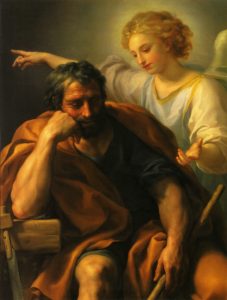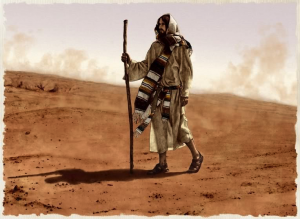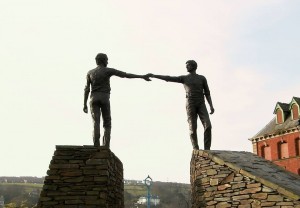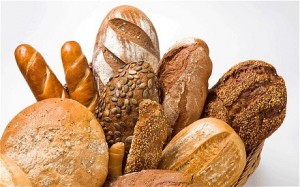====================
A sermon offered on the Fourth Sunday of Advent, December 20, 2015, to the people of St. Paul’s Episcopal Church, Medina, Ohio, where Fr. Funston is rector.
(The lessons for the day are Micah 5:2-5a; Canticle 15 [Luke 1:46-55]; Hebrews 10:5-10; Luke 1:39-45. These lessons may be found at The Lectionary Page.)
====================
 Languages and the study of languages fascinate me – if you didn’t know that before this series on the Lord’s Prayer, you probably know it now – and I am therefore always keenly aware of the difficulty of fully appreciating the Holy Scripture if we only consider the meaning of the English translation.
Languages and the study of languages fascinate me – if you didn’t know that before this series on the Lord’s Prayer, you probably know it now – and I am therefore always keenly aware of the difficulty of fully appreciating the Holy Scripture if we only consider the meaning of the English translation.
In the 1950s the social scientist Noam Chomsky proposed the idea that the ability to communicate complex data with our fellows is one of the characteristics that distinguishes human beings. He went so far as to propose that all humans, unlike all other animals, are genetically programmed with a limited set of rules for organizing language; this became known as “the Universal Grammar.” Chomsky’s idea became received wisdom and pretty much the basis for all academic study of linguistics despite the fact that there was not a shred of objective, empirical data to support it.
In fact, there is now plenty data contrary to Chomsky’s notion. We now know that a variety of animal species are able to communicate among themselves and convey very complex information to one another. Furthermore, studies of human languages around the world have repeatedly demonstrated that there are no linguistic universals; instead, there is abundant variation at all levels of linguistic organization. For example, there is a language spoken by one small group of people on one of the South Pacific islands in which verbs have no tenses; we would, I suppose, say that the verbs are all in the present tense but that would be misleading because their verbs, in fact, carry no sense of time. That sense is expressed, instead, by adjectives, and specifically by color adjectives; the color variation ascribed to the subject and object of a verb conveys the idea of past, present, or future.
Can you imagine how difficult it is to translate from that language into English, or vice versa? A direct translation
I bring this up because, although the difficulties are not nearly so great in the translation from Greek to English (which we must do to read the New Testament in our own language), such difficulties are nonetheless there, and especially so as we consider the last of the petitions in the Lord’s Prayer: “lead us not into temptation, but deliver us from evil,” in the older liturgical form; “save us from the time of trial and deliver us from evil,” in the newer.
Some of the difficulties that confront us are (a) Greek words which can be translated in more than one way; (b) Greek word order which differs from, and is less important than, word order is in English; and (c) the fact that biblical Greek uses no punctuation, leaving us to guess about phrases and sentences. (I’ll only address the first today, but the others are also present here.) And, then, there is the overarching matter that Jesus, in teaching us to pray, is also teaching us something about God and such teaching is always contingent, partial, and problematic; no human language can encompass the reality of God. Any human attempt to describe God, even Jesus’, is incomplete and may be ultimately misleading.
In today’s Gospel, Mary pregnant with Jesus visits her kinswoman Elizabeth who is pregnant with John the Baptizer. Elizabeth greets her, commenting on how active her own baby becomes at the sound of Mary’s voice and then praising Mary as “blessed” because she “believed that there would be a fulfillment of what was spoken to her by the Lord.” Mary’s answer is the Magnificat, the song which we recited as our Gradual, in which she says of God that God casts down the powerful, scatters the proud, and sends the rich away hungry, but that God lifts up the downtrodden, feeds those in need, and remembers those with whom God has made covenants. This doesn’t mean that God has nothing to do with the rich, nor that God ministers only to the poor, nor that God is not active in the lives of those outside of God’s covenants. It gives us a picture of God’s commitment to justice, but only a partial picture.
The same is true of the Lord’s Prayer. This petition (like all of the petitions in this prayer) is loaded with more meaning than we are aware of. Methodist theologians William Willimon and Stanley Hauerwas in their book Lord, Teach Us, say this about this petition:
Words like “save” and “trial” and “deliver” are words of crisis. They remind us that to pray this prayer means to be thrust into the middle of a cosmic struggle. At this point the temperature rises within the Lord’s Prayer. Things are not right in the world. It is as if something, someone has organized things against God. You pray this prayer faithfully, attempting to align your life to it and the next thing you know, it’s like you are under assault.
How often is salvation presented as some sort of helpful solution to everything that ails us. “Lonely? Come to Jesus and get that fixed.” “Alcoholic? Come to Jesus and be delivered of your addiction.” “Confused? Join the church and find all the answers.” In such a presentation of the gospel, salvation is the resolution of all your problems, the way to fix whatever ails you.
But this petition, in which we ask for salvation, deliverance and help in time of trial reminds us that salvation in Christ is an adventure, a journey, a larger drama. Praying this prayer is the beginning of problems we would never have had had we not met Christ and enlisted with Christ’s people. The forces of evil do not relinquish their territory without a fight and, in being saved, God’s newly won territory is you. (Willimon, Wm. H., and Stanley Hauerwas, Lord, Teach Us, Abingdon, Nashville:1996, ch. 8)
“At this point the temperature rises . . . . ” What a great way to present the tensions of this petition and of the protection for which it asks!
So let’s take a look at some of these “words of crisis,” as Willimon and Hauerwas label them. The first are the words translated in the King James Bible and in the earlier liturgical prayer as “lead us not into,” in the NRSV as “do not bring us into;” this is the Greek phrase me eisenenkes hemas eis, and either translation may be correct. The root verb is eisphero which can mean “lead”, “bring”, “carry”, or even “sustain.”
A problem for many people is not so much in the translation as in the idea that God could or would lead someone into temptation. Walter Kaiser in his book Hard Sayings of the Bible (InterVarsity, Downers Grove, IL:1996, p 366) exclaims, “Why should we ask God not to lead us into this? As if God would do any such thing! ‘God cannot be tempted by evil, nor does he tempt anyone’ (Jas 1:13).” This is why the newer liturgical form paraphrases the Greek as a plea for protection – “Save us from.”
Save us from what? The Greek word is peirasmon. If that is translated as “temptation”, and that in turn is understood to mean an enticement to evil, then it does seems strange and perhaps even offensive to ask God not to do what God would never do. However, “temptation, when the word occurs in the older versions of the Bible, means more than temptation to sin; it has the wider sense of testing.” (Kaiser, 367) A 1st Century Greek physician and natural philosopher named Dioscorides used the word peirasmos to describe medical experimentation (Mat. Med. Praef. 5.12), and a Greek-speaking Indian philosopher of the century before named Syntipas used the word to denote the afflictions of life which tend to crush those who do not possess sufficient inner fortitude. It is in this way that Jesus or the evangelists seem to have used it when he went with the disciples to the Garden of Gethsemane after the Last Supper.
When they arrived at the garden, he went away by himself admonishing his friends, “Pray that you may not come into the time of trial.” (Lk 22:40) When he returned to them, he found them asleep and again he admonished them: “Get up and pray that you may not enter into the time of trial.” (Lk 22:46) In the Greek of the New Testament, the words of Jesus’ admonitions are nearly identical to this petition of the Lord’s Prayer. Thus, the full first half in the new liturgical form is, “Save us from the time of trial.”
The second half of the petition is rendered the same in both liturgical forms, “Deliver us from evil.” Sometimes the Biblical versions are personalized, “Deliver us from the Evil One” on the basis of some Greek variants, which would seem to limit it to being a request for protection from (perhaps) Satan. However, most translators and commentators support the more general understanding, many noting that Jesus seems to be using a Hebrew literary or poetic form known as parallelism. “‘Lead us not into temptation’ and ‘deliver us from evil’ mean just the same thing: Prevent us being brought into temptation too great for us to conquer.” (Palmer, Albert W., Humanity’s Greatest Prayer, in Prayer and Spiritual Living, Vol 2, Kregel, Grand Rapids:1995, p. 10) As Lutheran writer Lois Tverberg says, “[This petition] is an all-encompassing plea for God to protect us from what is outside us, but what is inside as well.”
The Brazilian theologian Leonardo Boff suggests that this petition “presupposes a bitter awareness that human beings are fragile, subject to temptation of betraying their hope, becoming unfaithful to God, actually succumbing to temptation, and consequently being lost.” (The Lord’s Prayer: The Prayer of Integral Liberation, Orbis Books, Maryknoll:1983, p 97) And Franciscan author Michael Crosby observes, “We cannot offer this petition without being aware of how we ourselves might be contributing to the very evil (for others) that we pray to be delivered from ourselves.” (The Prayer That Jesus Taught Us, Orbis Books, Maryknoll:2002, p 171)
With that “better awareness” we know, even as we utter this prayer, that there will be times of trial. I’m sure that even as Mary sang the praises of the God who “casts down the mighty from their thrones,” she knew that she would still have to deal with life in an occupied Israel under the control of Imperial Rome. Even as she thanked God for “lift[ing] up the lowly” and “fill[ing] the hungry with good things,” she knew that she and Joseph would have to work hard earning very little to support themselves and the baby she carried. She knew and we know that there will be times of trial.
This petition, then, is for us, the family of Jesus, who know that despite our best intentions every day we will be faced with and tempted by choices which may be bad and unhealthy for us or for others, who know that left on our own we will give in and make (some of) those choices. This is a petition that God will give us the protection and the resources we need to resist those choices. “Save us from the time of trial and deliver us from evil” is a prayer for God’s protective guidance and strength to endure, because on our own, we cannot resist temptation; we cannot do what is right and good. It is a prayer that what Paul wrote to the church in Rome will be true for us:
[S]ince we are justified by faith, we have peace with God through our Lord Jesus Christ, through whom we have obtained access to this grace in which we stand; and we boast in our hope of sharing the glory of God. And not only that, but we also boast in our sufferings, knowing that suffering produces endurance, and endurance produces character, and character produces hope, and hope does not disappoint us, because God’s love has been poured into our hearts through the Holy Spirit that has been given to us. (Rom 5:1-5)
Endurance, character, hope, and love: these are the protective gifts we ask for when we pray, “Save us from the time of trial and deliver us from evil.”
An oft-repeated alliterative aphorism sometimes attributed to former Archbishop of Canterbury Donald Coggan summarizes the Lord’s Prayer as one for provision, pardon, and protection. We pray for our basic needs; we pray for forgiveness; we pray for safety from evil, both that of others and our own.
Despite the difficulties of translation from Aramaic to Greek to English, despite cultural differences between 1st Century Palestine and 21st Century America, in our world with all of its complications, in our world which is (as Willimon and Hauerwas remind us) a battlefield where the battle may already be won but still must be fought, this prayer reminds us that these three things – provision, pardon, and protection – are ultimately all we need to live for God, whose was, and is, and will be “the kingdom, the power, and the glory . . . now and for ever. Amen.”
====================
A request to my readers: I’m trying to build the readership of this blog and I’d very much appreciate your help in doing so. If you find something here that is of value, please share it with others. If you are on Facebook, “like” the posts on your page so others can see them. If you are following me on Twitter, please “retweet” the notices of these meditations. If you have a blog of your own, please include mine in your links (a favor I will gladly reciprocate). Many thanks!
====================
Father Funston is the rector of St. Paul’s Episcopal Church, Medina, Ohio.
 In a few minutes, when this sermon comes to an end, we will all stand together as we do every week and recite the Nicene Creed in which we will say that, among other things, we believe that Jesus Christ
In a few minutes, when this sermon comes to an end, we will all stand together as we do every week and recite the Nicene Creed in which we will say that, among other things, we believe that Jesus Christ In these few verses, Matthew opens up for us the complexity of Joseph as a human being. He hints at, and we can imagine, Joseph’s distress, his sense of betrayal, his disappointment, and all the other emotions he must have experienced. We can imagine also the fear and hurt that Mary probably would have felt as she and her betrothed sorted out the complications caused by the divine intrusion into their relationship.
In these few verses, Matthew opens up for us the complexity of Joseph as a human being. He hints at, and we can imagine, Joseph’s distress, his sense of betrayal, his disappointment, and all the other emotions he must have experienced. We can imagine also the fear and hurt that Mary probably would have felt as she and her betrothed sorted out the complications caused by the divine intrusion into their relationship. Most of the time when we hear this story of John’s disciples coming to Jesus we focus on John’s question – “Are you the one who is to come, or are we to wait for another?” (Mt 11:3) – and on Jesus’ answer to it which is neither a “yes” nor a “no” but a pointing to the evidence – “the blind receive their sight, the lame walk, the lepers are cleansed, the deaf hear, the dead are raised, and the poor have good news brought to them” (Mt 11:5).
Most of the time when we hear this story of John’s disciples coming to Jesus we focus on John’s question – “Are you the one who is to come, or are we to wait for another?” (Mt 11:3) – and on Jesus’ answer to it which is neither a “yes” nor a “no” but a pointing to the evidence – “the blind receive their sight, the lame walk, the lepers are cleansed, the deaf hear, the dead are raised, and the poor have good news brought to them” (Mt 11:5). A few years ago I read an essay about the trials and tribulations of relocation, particularly from region to region within our country. In it the author made the comment that when relocating to the South, there were two invariably asked questions of the newcomer: “Who are your people?” and “Where do you go to church?” These, he said, are quintessentially Southern inquiries which serve to position the interrogated in a place’s social network and milieu. The assumptions, of course, are that no one would relocate to a town where they did not have “people” (i.e., family members) and that everyone goes to church somewhere.
A few years ago I read an essay about the trials and tribulations of relocation, particularly from region to region within our country. In it the author made the comment that when relocating to the South, there were two invariably asked questions of the newcomer: “Who are your people?” and “Where do you go to church?” These, he said, are quintessentially Southern inquiries which serve to position the interrogated in a place’s social network and milieu. The assumptions, of course, are that no one would relocate to a town where they did not have “people” (i.e., family members) and that everyone goes to church somewhere.  “Two will be in the field; one will be taken and one will be left. Two women will be grinding meal together; one will be taken and one will be left. Keep awake therefore, for you do not know on what day your Lord is coming.” (Matt 24:40-42) You probably have friends who have told you these verses from Matthew’s Gospel describe something called “the Rapture.” You may have read the Left Behind books or seen the movies. So you may think you have a handle on what these verses mean and why they are offered to us as we begin our Advent preparation to celebrate the anniversary of Christ’s Incarnation and to look forward to his return, his “Second Coming.”
“Two will be in the field; one will be taken and one will be left. Two women will be grinding meal together; one will be taken and one will be left. Keep awake therefore, for you do not know on what day your Lord is coming.” (Matt 24:40-42) You probably have friends who have told you these verses from Matthew’s Gospel describe something called “the Rapture.” You may have read the Left Behind books or seen the movies. So you may think you have a handle on what these verses mean and why they are offered to us as we begin our Advent preparation to celebrate the anniversary of Christ’s Incarnation and to look forward to his return, his “Second Coming.” Languages and the study of languages fascinate me – if you didn’t know that before this series on the Lord’s Prayer, you probably know it now – and I am therefore always keenly aware of the difficulty of fully appreciating the Holy Scripture if we only consider the meaning of the English translation.
Languages and the study of languages fascinate me – if you didn’t know that before this series on the Lord’s Prayer, you probably know it now – and I am therefore always keenly aware of the difficulty of fully appreciating the Holy Scripture if we only consider the meaning of the English translation.  John the Baptizer came, Luke tells us, “proclaiming a baptism of repentance for the forgiveness of sins.” (Lk. 3:3) In today’s Gospel lesson, John tells the crowds who came to him, “Bear fruits worthy of repentance.” (v. 8) Our catechism teaches us that repentance is required of us to receive the Sacraments. With regard to baptism, the catechetical requirement is that we “renounce Satan, repent of our sins, and accept Jesus as our Lord and Savior;” with regard to the Holy Eucharist, that we “examine our lives, repent of our sins, and be in love and charity with all people.” (BCP 858, 860) But John’s admonition and the Catechism’s requirements leave us wondering, “What exactly is ‘repentance’?”
John the Baptizer came, Luke tells us, “proclaiming a baptism of repentance for the forgiveness of sins.” (Lk. 3:3) In today’s Gospel lesson, John tells the crowds who came to him, “Bear fruits worthy of repentance.” (v. 8) Our catechism teaches us that repentance is required of us to receive the Sacraments. With regard to baptism, the catechetical requirement is that we “renounce Satan, repent of our sins, and accept Jesus as our Lord and Savior;” with regard to the Holy Eucharist, that we “examine our lives, repent of our sins, and be in love and charity with all people.” (BCP 858, 860) But John’s admonition and the Catechism’s requirements leave us wondering, “What exactly is ‘repentance’?”  It’s the Second Sunday of Advent so according to our lectionary tradition, we hear the words of John the Baptizer, the voice of one crying in the desert, calling us to clean up the roadways and build a straight path for God’s coming. We are all familiar with the Baptizer. He’s some sort of cousin of Jesus. He’s a bit of a wild man; he lives in the wilderness wearing rough clothing and eating only what foods he can pick from desert plants and animals, “locusts and wild honey” is the way the evangelists put it. This year we hear Luke’s version of John’s story.
It’s the Second Sunday of Advent so according to our lectionary tradition, we hear the words of John the Baptizer, the voice of one crying in the desert, calling us to clean up the roadways and build a straight path for God’s coming. We are all familiar with the Baptizer. He’s some sort of cousin of Jesus. He’s a bit of a wild man; he lives in the wilderness wearing rough clothing and eating only what foods he can pick from desert plants and animals, “locusts and wild honey” is the way the evangelists put it. This year we hear Luke’s version of John’s story.

